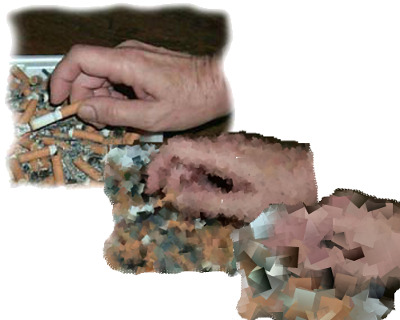Complacency is a "feeling of security, often while unaware of some potential danger." It's normal to slowly grow complacent during the months and years after successfully ending nicotine use.
Complacency is fueled by slowly diminishing memory of daily captivity and the factors that compelled us to seek freedom. It's born of a gradually declining ability to recall the intensity of early withdrawal anxieties, the power of cue triggered crave episodes, or the time spent enduring conscious fixation.
Most of us failed to keep a detailed record of why we commenced recovery or what those first two weeks were like. Without a record, we're forced to rely upon our memory to accurately and vividly preserve the truth, the whole truth and nothing but the truth.
 But now, the memory in which we placed our trust is failing.
But now, the memory in which we placed our trust is failing.
It isn't that our memory is bad, faulty or doing anything wrong. In fact, it's working as designed to preserve in as much detail as possible life's joyful events, while suppressing and helping us forget life's stressful events, anxieties, trauma, and pain.
To do otherwise would make life inside these minds unbearable. In fact, post-traumatic stress disorder (PTSD) is believed to reflect a breakdown in the mind's ability to forget.[1]
If women were forced to remember the agony and pain of childbirth, most would likely have only one child. We are each blessed with the ability to forget.
So how does the recovered nicotine addict who failed to record their journey home revive their passion for freedom and recall liberty's price? If we forget the past are we destined to repeat it? Not necessarily.
But just as any loving relationship needs nourishment to flourish, if we take our recovery for granted, the flame could eventually die, and the fire go out.
I intend to protect my freedom until I draw my last breath. If you feel the same, our recoveries need nourishment. If we do, we win. If not, we risk complacency allowing nicotine back into our bloodstream. We risk dying as slaves.
Whether daily, monthly or just once a year, our recovery benefits from care. But where do we turn if our recovery memories have been suppressed and we kept no record to refresh our recollections?
Our best resource is probably our brothers and sisters still in bondage. Why not enlist their help in revitalizing our own memories of active dependency?
Talk to them. Let them know what you seek. Encourage them to be as candid and truthful as possible. Although it may look like they're enjoying their addiction, their primary objective is to stay one step ahead of insula driven urges and craves.
Tell them the truth about where you now find yourself. Although not always the case, with most you'll find their responses inspiring. Be kind and sincere. It wasn't long ago that those were our shoes.
Try hard to recall those first two weeks without nicotine. Think about earlier uneducated attempts. What were they like? Can you recall your mind begging to be fed? Feel the anxieties. Were you able to concentrate? How was your sleep?
Did you feel depressed, angry, irritable, frustrated, restless or anxious? Were there rapidly cycling emotions, irrational thinking or emotional outbursts? Do you remember these things? Do you remember the price you paid? Do you recall the reasons you willingly paid it?
If you have access to a computer, go online and visit any of the scores of smoking cessation support groups. There we'll find thousands of battles being fought, hear a multitude of cries and watch hundreds struggling for survival as they dream of the calmness and quiet we now call home.
The newbies you'll see cannot begin to imagine traveling so far, that trying to recall the turmoil they now feel will someday soon become their greatest challenge of all.
If permitted, send a message to those in need. The most important thing you can tell them is the truth about why you came. If still in the first few days, they may be facing significant anxieties. Their mind may have them convinced that their emotional storm will never end.
Don't pretend that you can feel their anxiety. Instead give them what they need most, the truth. Let them know that you've traveled so far that it's now difficult to relate. Tell them how comfortable and complacent you've grown. Describe last week and how many seconds, if any, that you devoted to thinking about using.
Fear of the unknown is frightening. Teach them what life on Easy Street is like. By aiding them we aid ourselves.
It may be that complacency has you at a point where thoughts of using are again taking root. But think back. How long had you gone without wanting?
If it is happening, rekindling pride in the amazing journey you once made can silence such chatter.
If occurring, I encourage you to re-read Chapters 4 and Chapter 12, as I suspect that you've either developed a romantic fixation with using, or failed to let go of one during recovery.
References:
All rights reserved
Published in the USA
